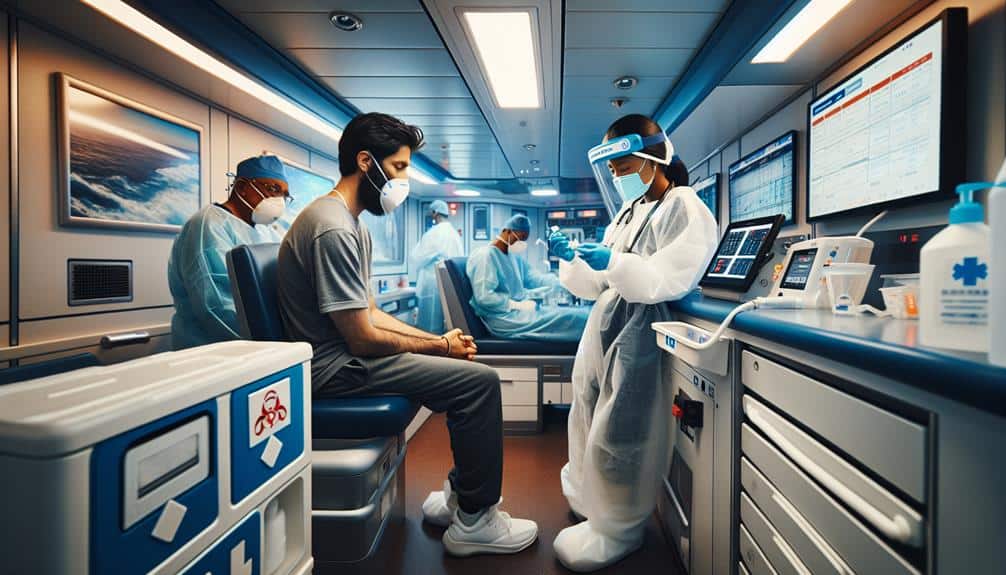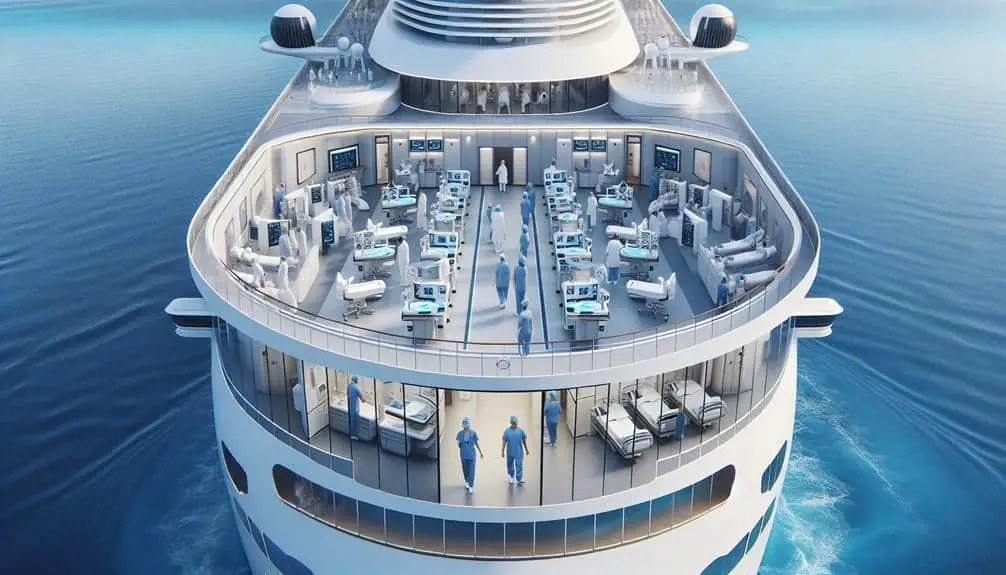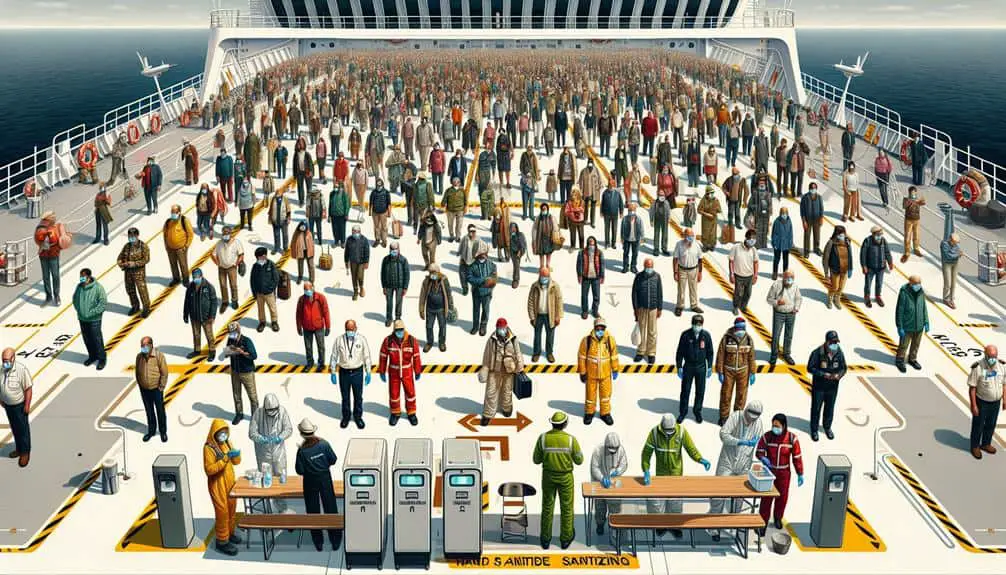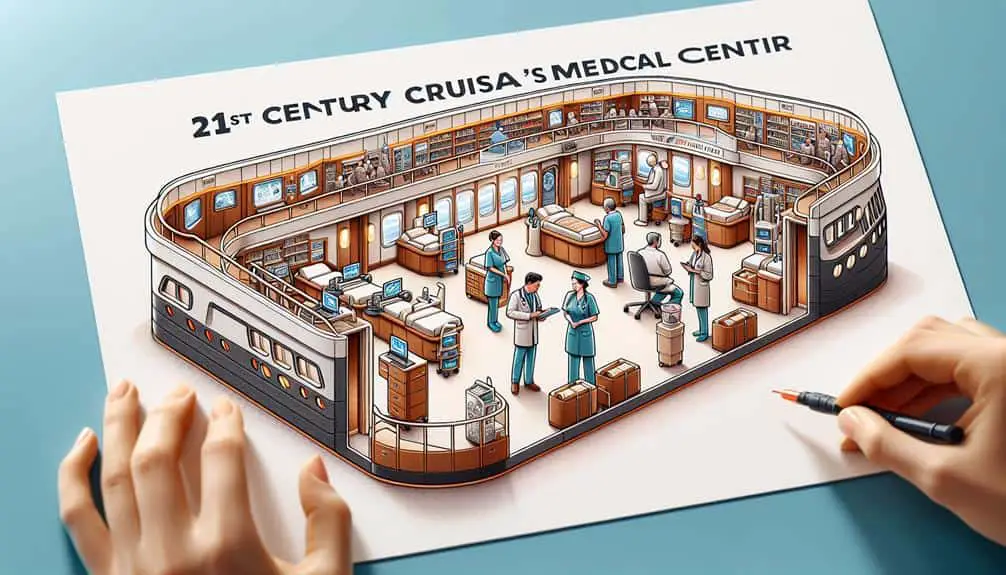Guarantee safety in cruise ship medical units by prioritizing emergency response, infection control, medication management, staff training, and equipment maintenance. Triage patients swiftly during emergencies. Execute evacuation protocols promptly. Communicate effectively within the team. Enforce strict infection control measures. Emphasize proper hand hygiene and isolation for contagious illnesses. Establish clear medication protocols and monitor for interactions. Train staff thoroughly and ensure certifications are up to date. Maintain equipment meticulously to prevent malfunctions. Following these top safety protocols guarantees the highest level of care for all onboard.
Key Points
- Implement strict infection control measures to prevent the spread of illnesses onboard.
- Train staff in emergency response procedures for efficient patient triage and evacuation.
- Follow meticulous medication management protocols to ensure safe administration.
- Regularly inspect and maintain medical equipment to guarantee functionality.
- Ensure all staff are well-trained, certified, and equipped to handle medical emergencies at sea.
Emergency Response Procedures
In case of emergencies on board, swiftly activating the established response procedures is essential for ensuring the safety and well-being of all individuals on the cruise ship. Patient triage, evacuation, team communication, and coordination are key elements in managing emergency situations effectively.
During emergencies, the first step is patient triage. Trained medical staff must quickly assess and prioritize the injured or ill based on the severity of their condition. This guarantees that those in critical condition receive immediate attention.
Simultaneously, evacuation procedures need to be implemented promptly. Clear protocols for safely moving individuals to designated areas or medical facilities must be followed to prevent further harm. Team communication and coordination play an important role in executing these tasks smoothly.
Effective communication ensures that everyone is informed of their roles and responsibilities during the emergency. Team coordination guarantees that each member knows how to contribute to the overall response effort. By adhering to these procedures, cruise ship medical units can efficiently handle emergencies and safeguard the well-being of passengers and crew.
Infection Control Measures
Implement strict infection control measures to safeguard the health and well-being of individuals on the cruise ship. Adhering to proper hand hygiene practices is essential in preventing the spread of infections. Encourage frequent handwashing with soap and water or the use of alcohol-based hand sanitizers. Proper hand hygiene not only protects the individual but also prevents the transmission of pathogens to others.
In addition to hand hygiene practices, isolation precautions play an important role in containing infectious diseases. Designate isolation areas for individuals showing symptoms of contagious illnesses to prevent further spread. Make sure that healthcare staff are trained in the proper protocols for isolating patients effectively while providing necessary care.
Regularly review and update infection control policies to align with the latest guidelines and best practices. Monitoring compliance with these measures is crucial to maintaining a safe and healthy environment onboard. By prioritizing infection control through strict hand hygiene practices and isolation precautions, the cruise ship medical unit can effectively mitigate the risk of outbreaks and protect the well-being of all individuals onboard.
Medication Management Protocols
To guarantee the safe and effective management of medications onboard the cruise ship, establish clear protocols for storage and administration. Proper medication administration is essential to ensure the well-being of passengers and crew members. Implementing strict guidelines for the storage of medications helps prevent degradation and maintains their efficacy. Additionally, having precise procedures for medication administration reduces the risk of errors and enhances overall safety.
When managing medications on a cruise ship, it's important to take into account potential drug interactions. These interactions can occur when two or more drugs react with each other, leading to unexpected side effects or reduced effectiveness. By staying vigilant and thoroughly documenting all medications administered, you can mitigate the risks associated with drug interactions.
Adhering to medication management protocols not only safeguards the health of individuals onboard but also promotes a culture of accountability and professionalism within the medical unit. Remember, meticulous attention to detail in medication administration is paramount to ensure the well-being of everyone on the cruise ship.
Staff Training and Certification
Ensuring staff undergo comprehensive training and obtain required certifications is vital for the efficient operation of the cruise ship medical unit. Staff education plays a pivotal role in equipping personnel with the necessary skills and knowledge to handle medical emergencies effectively. The certification process validates their competency and guarantees that they meet industry standards in providing medical care onboard.
Effective staff training programs cover a wide range of topics, including basic life support, emergency response protocols, medication administration, and infection control measures. These programs should be regularly updated to reflect the latest developments in medical practices and protocols. Additionally, ongoing education opportunities help staff stay current with their skills and knowledge.
The certification process typically involves both theoretical knowledge assessments and practical skill evaluations. Staff members must demonstrate proficiency in various medical procedures and protocols to obtain and maintain their certifications. By adhering to rigorous training and certification standards, cruise ship medical units can enhance the safety and well-being of passengers and crew members alike.
Equipment Maintenance Guidelines
Maintaining the equipment in the cruise ship medical unit is essential for ensuring peak functionality and readiness in handling medical emergencies. Preventive maintenance plays a critical role in keeping the equipment in its best condition. Regularly scheduled inspections are crucial to identify any potential issues before they escalate into critical problems. By adhering to a strict preventive maintenance schedule, you can minimize the risk of equipment failure during crucial moments.
Equipment inspection is a key component of the maintenance guidelines. Conduct thorough inspections of all medical devices to guarantee they're functioning correctly. Check for any signs of wear and tear, loose connections, or irregularities that may impact the equipment's performance. Address any issues promptly and document all maintenance and inspection activities for future reference. Following these equipment maintenance guidelines diligently will enhance the efficiency and reliability of the medical unit, ensuring it's always prepared to deliver high-quality care during emergencies.
Frequently Asked Questions
How Are Medical Emergencies Handled for Passengers With Pre-Existing Conditions on a Cruise Ship?
In case of medical emergencies for passengers with pre-existing conditions on a cruise ship, the staff guarantees immediate care. Precautionary measures include having medical history on file, trained personnel, and access to necessary equipment for passenger accommodations.
What Measures Are in Place to Ensure the Privacy and Confidentiality of Patients in the Cruise Ship Medical Unit?
To safeguard patient confidentiality on a cruise ship, strict protocols are followed in the medical unit. Emergency response teams are trained to prioritize patient privacy while delivering prompt and effective care, maintaining confidentiality throughout the process.
How Often Are Medical Supplies and Equipment Checked for Expiration Dates and Replaced on a Cruise Ship?
You should make sure that medical supplies and equipment are regularly checked for expiration dates and promptly replaced on a cruise ship. Proper inventory management and equipment maintenance are vital for staff training and effective emergency response.
Are There Specific Protocols in Place for Handling Psychiatric Emergencies in the Cruise Ship Medical Unit?
When facing psychiatric emergencies onboard, cruise ship medical units must implement crisis management protocols. Staff receive emergency response training to guarantee proper patient care. Effective communication and maintenance of medical equipment are vital, along with onshore coordination, privacy, and confidentiality measures for pre-existing conditions.
How Is Communication and Coordination With Onshore Medical Facilities Managed in the Event of a Serious Medical Emergency on a Cruise Ship?
During a serious medical emergency on a cruise ship, communication and coordination with onshore medical facilities are managed through telemedicine and remote consultations. This allows for swift emergency response and guarantees access to additional medical expertise.



